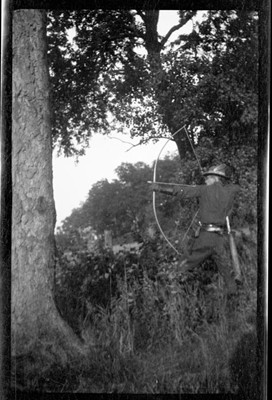|
Contributor to the Sport, Influence on the Sport
Aldo Leopold is known as the father of wildlife
management. Not only was he a brilliant and original thinker, he was also a beautiful
writer. All wildlife students have read (or should have
read) his Game Management text written in 1933. All
citizens should have read, or should read, his classic book,
A Sand County Almanac. Many do not realize that he was
a bowhunter and bowyer, and a promoter of bowhunting in the
1920's, 30's, and 40's. Yes, he made his own long bows and
hunted in his home state of Wisconsin and also in the southwest.
he a brilliant and original thinker, he was also a beautiful
writer. All wildlife students have read (or should have
read) his Game Management text written in 1933. All
citizens should have read, or should read, his classic book,
A Sand County Almanac. Many do not realize that he was
a bowhunter and bowyer, and a promoter of bowhunting in the
1920's, 30's, and 40's. Yes, he made his own long bows and
hunted in his home state of Wisconsin and also in the southwest.
The Aldo Leopold Foundation describes Dr. Leopold in
the following way.
“Considered by many as the father of wildlife management
and of the United States' wilderness system, Aldo Leopold was a
conservationist, forester, philosopher, educator, writer, and
outdoor enthusiast.
Born in 1887 and raised in Burlington, Iowa, Aldo Leopold
developed an interest in the natural world at an early age,
spending hours observing, journaling, and sketching his
surroundings. Graduating from the Yale Forest School in 1909, he
eagerly pursued a career with the newly established U.S. Forest
Service in Arizona and New Mexico. By the age of 24, he had been
promoted to the post of Supervisor for the Carson National
Forest in New Mexico. In 1922, he was instrumental in developing
the proposal to manage the Gila National Forest as a wilderness
area, which became the first such official designation in 1924.
In addition to his famous “A Sand County Almanac”
Leopold also authored the first text on “Game Management”
and was the countries first Professor of Wildlife Management.
The professional society of wildlife biologists, The Wildlife
Society, has named their top award the Aldo Leopold Memorial
Award. In a pivotal paper he published in the Journal of
Wildlife Management in 1943 (Wildlife in American Culture)
Leopold introduced the concept of wildlife values and their
origins. Understanding the values, and thus motivations,
behind how people perceive, use, and appreciate natural
resources is critical to effective management. To this
day, there are numerous scientists studying this important
aspect of wildlife science within the fields of sociology and
human dimensions.
Dr. Leopold was one of 40 people who led the cause for
obtaining a bow season in Wisconsin. His wife, Estella,
was also a bowhunter and during the effort to get this bow
season, there were several Wisconsin newspaper articles written
about her interest in bowhunting.
Leopold’s writings continue to show us that he was far
ahead of his time. Consider this quote. "The
disquieting thing . . . is the trophy hunter who never grows up,
in whom the capacity for isolation, perception and husbandry is
undeveloped, or perhaps lost. He is the motorized ant who
swarms the continents before learning to see his own back yard,
who consumes but never creates outdoor satisfaction. For
him the recreational engineer dilutes the wilderness and
artificializes its trophies in the fond belief that he is
rendering a public service."
This quote as well.
"It is inconceivable to me that an ethical relation to the
land can exist without love, respect, and admiration for land,
and a high regard for its value. By value, I mean
something far broader than mere economic value."
And another.
"Every woodsman knows that deer in many places are
exterminating the plants on which they depend for food . . .
something is out of kilter."
And this one is just fun, but so true.
"I had a bird dog names Gus. When Gus couldn't find
pheasant, he worked up an enthusiasm for rails and meadowlarks.
This whipped up zeal for unsatisfactory substitutes masked his
failure to find the real thing. It assuaged his inner
frustration. We conservationists are like that . . . to
assuage our inner frustration we have found us a meadowlark . .
. it smells like success. There is danger in the
assuagement of honest frustration; it helps us forget we have
not yet found a pheasant."
|